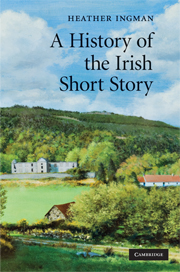Book contents
- Frontmatter
- Contents
- Acknowledgments
- 1 Introduction
- 2 The nineteenth century: nation and short story in the making
- 3 Fin de siècle visions: Irish short fiction at the turn of the century
- 4 The modern Irish short story: Moore and Joyce
- 5 1920–1939: years of transition
- 6 1940–1959: isolation
- 7 1960–1979: time, memory and imagination
- 8 1980 to the present: changing identities
- Notes
- Biographic glossary
- Bibliographic essay
- Index
3 - Fin de siècle visions: Irish short fiction at the turn of the century
Readings: W. B. Yeats and George Egerton
Published online by Cambridge University Press: 04 August 2010
- Frontmatter
- Contents
- Acknowledgments
- 1 Introduction
- 2 The nineteenth century: nation and short story in the making
- 3 Fin de siècle visions: Irish short fiction at the turn of the century
- 4 The modern Irish short story: Moore and Joyce
- 5 1920–1939: years of transition
- 6 1940–1959: isolation
- 7 1960–1979: time, memory and imagination
- 8 1980 to the present: changing identities
- Notes
- Biographic glossary
- Bibliographic essay
- Index
Summary
In the Dublin University Review of 1886 W. B. Yeats quoted an acquaintance as saying: ‘I would gladly lecture in Dublin on Irish literature, but the people know too little about it.’ Six years later Yeats was complaining that: ‘In the small towns of Ireland are few book shops and few books.’ The situation was to improve. In Dana, a monthly review founded by Frederick Ryan and ‘John Eglinton’ (W. K. Magee) in 1904, the proposal by the novelist, Jane Barlow, that Ireland introduce a circulating library scheme, similar to one she had seen operating in Wales, for people living in remote country areas, prompted a response from the Secretary of the Rural Libraries Association to the effect that rural councils now had the power to establish libraries in their districts and what was needed was good lists of books. This correspondence reflected the fact that the number of available readers in Ireland was increasing: between 1850 and 1900 the number of National Schools doubled and attendance was stimulated by the Education Act of 1892, rising to over 60 per cent in the 1890s and 75 per cent by 1908. This in turn led to a sharp decrease in rates of illiteracy: whereas in 1851, 45 per cent of the Irish population had been illiterate, by 1911 the rate was down to 12 per cent.
- Type
- Chapter
- Information
- A History of the Irish Short Story , pp. 55 - 83Publisher: Cambridge University PressPrint publication year: 2009

